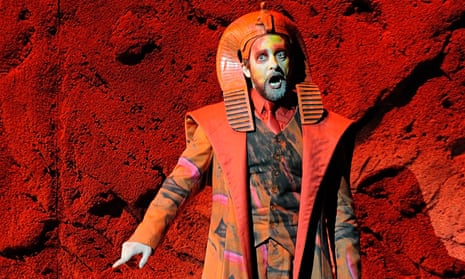Welsh National Opera followers wearying of Old Testament libretti (Nabucco and Moses und Aaron in June) or wary of a surfeit of Rossini (the recent Guillaume Tell) might balk at the combination of these two in the company’s latest production. They shouldn’t. Rossini’s Mosè in Egitto is worth seeing not just for its rarity live, but for excellent singing from the WNO cast and chorus alike.
Keen to differentiate it from his opera buffa, to justify its performance during Lent, the composer called this an azione tragico-seria, giving the love story between Pharaoh’s son and the Hebrew Elcia parallel importance to the fate of the Israelites in Egypt. The bel canto writing is often beautiful, and conductor Carlo Rizzi points to Rossini looking toward the dramatic power of Verdi though, more intriguingly, glancing back to Mozart, with shades of the Requiem and his late clarinet writing. When Elcia is sung as well as Claire Booth does here, it’s pretty irresistible. Booth’s soprano is always expressive and flexible, and Christine Rice’s rich-toned Amaltea and Leah-Marian Jones’s Amenofi, round out a formidable trio. Miklós Sebestyén’s Mosè, hair mischievously tweaked to suggest devil’s horns, channelling Marc Chagall, is a vocal force. He is ably matched by Andrew Foster-Williams’s Pharaoh, while tenor David Alegret, as his son Osiride, has an instrumental agility yet is hard on the ear. Barry Banks’s Aronne and Nicky Spence’s Mambre are much easier.
Director David Pountney’s most striking theatrical gesture is the opening plague of darkness – stage and auditorium black, with Rizzi’s baton a luminous strand. In a low-budget, though vividly coloured affair, the permutations of two vast square panels and stepped risers make the final parting of the Red Sea predictable, though fortunately not laughable – as in the original Italian premiere.

Comments (…)
Sign in or create your Guardian account to join the discussion